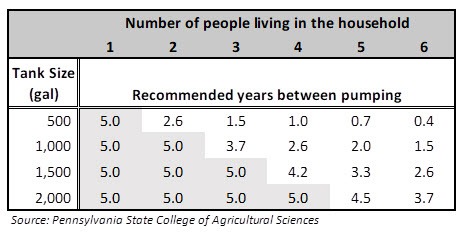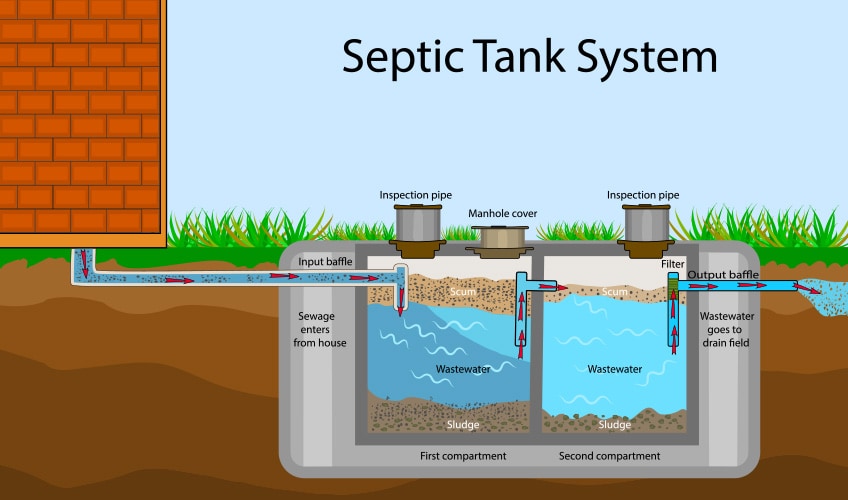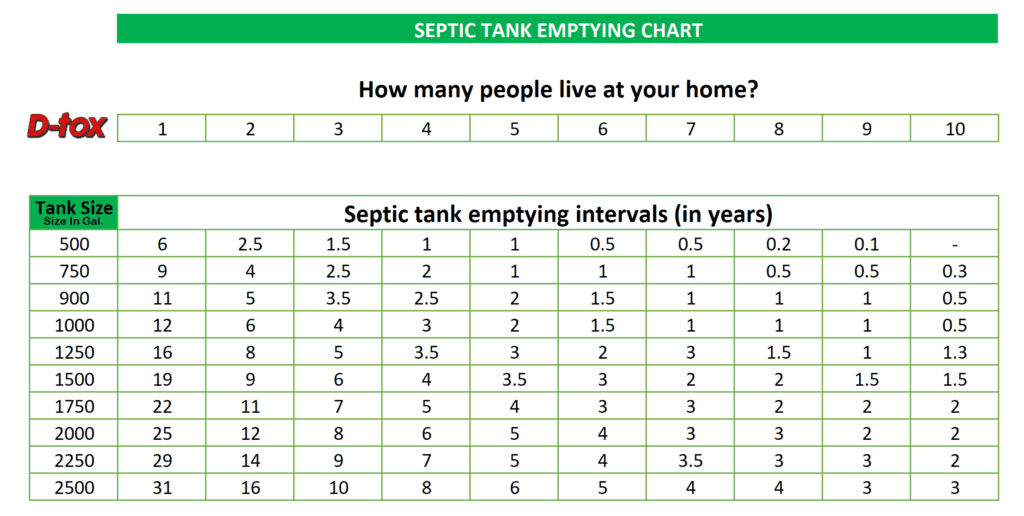In this article, we will discuss the topic of septic tank maintenance and how often they need to be cleaned. We’ll explore the factors that determine the cleaning frequency and provide some general guidelines to help you plan your septic tank maintenance routine effectively. By the end of this article, you’ll have a better understanding of the maintenance intervals for septic tanks and be equipped with the knowledge to keep your system running smoothly. So, let’s get started!
Importance of Regular Septic Tank Cleaning
Prevent Blockages and Backups
Regular septic tank cleaning is of utmost importance to prevent blockages and backups in the plumbing system. Over time, solid waste materials and sludge accumulate in the tank, which can lead to clogs in the drain field and pipes. When these blockages occur, wastewater can backup into your home, causing unpleasant odors, slow drains, and even sewage overflow. By scheduling regular cleanings, you can remove the build-up and ensure the smooth flow of waste materials.
Maintain Proper Functioning
A septic tank is an integral part of a property’s wastewater treatment system. It is responsible for separating solid waste from the liquid effluent and allowing the treated water to be safely returned to the environment. Regular cleaning helps maintain the proper functioning of the septic tank by preventing excessive build-up of solid waste and sludge. When the tank becomes overloaded with waste, it can lead to system failure, costly repairs, and even the need for a complete replacement.
Avoid Costly Repairs
Ignoring septic tank maintenance can result in costly repairs. When a septic tank is not cleaned regularly, the accumulated solid waste can clog pipes, damage the drain field, and cause damage to the entire septic system. These repairs can be quite expensive and may require excavation or even the installation of a new septic system. By investing in regular cleanings, you can avoid these expensive repairs and prolong the lifespan of your septic tank.
Factors Affecting Cleaning Frequency
Household Size
The size of your household plays a significant role in determining how often your septic tank needs to be cleaned. Larger households tend to generate a higher volume of wastewater and solid waste, which can lead to faster build-up in the tank. If you have a small household, you may be able to stretch out the cleaning intervals compared to a larger household.
Water Usage
Water usage patterns in your household also affect the cleaning frequency of the septic tank. If you have high water usage, such as multiple showers daily, frequent laundry loads, and excessive toilet flushing, your septic tank may require more regular cleaning. On the other hand, if you practice water-saving habits, such as using low-flow fixtures and avoiding excessive water usage, you may be able to extend the cleaning intervals.
Septic Tank Size
The size of your septic tank is another crucial factor to consider when determining maintenance intervals. Smaller tanks have less capacity to hold solid waste and sludge, which means they may need more frequent cleanings compared to larger tanks. The size of your septic tank should be determined by the size of your household and water usage to ensure optimal performance and minimize the need for frequent cleanings.
Recommended Cleaning Intervals
Every 3-5 Years for Average Household
For the average household, a septic tank should be cleaned every 3-5 years. This interval allows enough time for the tank to accumulate a significant amount of solid waste and sludge while still maintaining proper function. However, it is essential to monitor your tank regularly for signs that it may need cleaning sooner.
More Frequent Cleaning for Larger Households
If you have a larger household with increased water usage, it is advisable to schedule more frequent septic tank cleanings. Depending on the size of your household and usage, you may need to clean your tank every 2-3 years. Regular monitoring of your tank’s levels and taking note of any signs of a full tank can help determine the ideal cleaning intervals for your specific household needs.
Modified Schedule for Low Water Usage
For households with low water usage, such as vacation homes or properties with a limited number of occupants, septic tank cleaning intervals can be extended. With reduced water entering the system, there will be less solid waste and sludge accumulation, requiring less frequent cleanings. However, it is important to remember that regular monitoring and inspection of the tank’s levels and signs of fullness are still necessary to avoid any potential issues.
Signs That Your Septic Tank Needs Cleaning
Slow Drains
One of the most common signs that your septic tank needs cleaning is slow drains throughout your property. If you notice that the water is taking longer to drain from your sinks, showers, or toilets, it may indicate that the tank is reaching its capacity and needs to be emptied. Slow drains are often caused by clogs or backups resulting from an overloaded septic tank.
Foul Odors
Another telltale sign that your septic tank needs cleaning is foul odors emanating from your drains or the area surrounding your septic system. When the tank becomes full, the solid waste and sludge can release unpleasant odors, which may seep back into your home through the drains or become noticeable in your yard. If you detect foul smells, it is crucial to schedule a septic tank cleaning to prevent further issues.
Pooling Water in Yard
Pooling water in your yard, especially around the area where your septic system is located, can indicate a full septic tank. When a tank is overloaded, it may not be able to handle the incoming wastewater properly, leading to water accumulating on the surface. This pooling water can pose a health risk as it may contain harmful bacteria and pathogens. If you observe any pooling water, it is essential to have your septic tank cleaned promptly to prevent further damage.

Importance of Professional Septic Tank Cleaning
Thorough and Proper Cleaning
While it may be tempting to attempt DIY septic tank cleaning, professional cleaning is highly recommended. Professional septic tank cleaners have the knowledge, experience, and specialized equipment to thoroughly clean the tank and remove all the accumulated solid waste and sludge. They ensure that no residue is left behind, which can help prevent blockages, backups, and potential damage to your septic system.
Ensuring Compliance with Regulations
Another essential aspect of professional septic tank cleaning is ensuring compliance with local regulations and guidelines. Properly licensed and certified septic tank cleaners are familiar with the specific requirements of your area and can ensure that all regulations are followed during the cleaning process. This compliance is crucial, as it helps protect the environment and safeguard public health.
Expert Inspection for Potential Issues
Professional septic tank cleaners can also provide expert inspection during the cleaning process. They can identify potential issues or signs of damage that may require immediate attention. By addressing these issues early on, you can prevent more significant problems and costly repairs in the future. Their expertise allows them to troubleshoot and advise you on the best course of action to maintain the longevity and functionality of your septic system.
DIY Septic Tank Cleaning
Risks and Challenges
While professional septic tank cleaning is recommended, some homeowners may choose to attempt DIY cleaning. However, DIY cleaning can be risky and challenging, especially for those without proper knowledge or experience. Mishandling the tank or its contents can lead to personal injury, environmental pollution, and damage to the septic system. It is crucial to weigh the risks and challenges before deciding to clean the tank yourself.
Proper Safety Precautions
If you decide to proceed with DIY septic tank cleaning, it is essential to prioritize safety and take proper precautions. This includes wearing protective clothing, gloves, and eyewear to minimize contact with the waste materials. It is also crucial to follow proper disposal methods for the waste materials, ensuring they are disposed of at designated facilities or according to local regulations. Additionally, ensure proper ventilation in the area and avoid open flames or smoking during the cleaning process.
Knowing When to Seek Professional Help
Even if you choose to attempt DIY septic tank cleaning, it is crucial to know when to seek professional help. If you encounter any issues or challenges during the process, such as a difficult clog, unexpected odors, or signs of damage, it is best to stop and contact a professional septic tank cleaner. They have the expertise to handle such situations safely and effectively, ensuring the proper maintenance of your septic system.
Common Misconceptions About Septic Tank Cleaning
Adding Additives for Maintenance
One common misconception about septic tank cleaning is that adding various additives, such as enzymes or chemicals, can replace the need for regular cleaning. While these additives may aid in the breakdown of waste materials, they do not eliminate the need for proper cleaning. Regular septic tank cleaning is necessary to remove solid waste and sludge buildup, which cannot be fully addressed by additives alone.
Septic Tank Additives vs. Cleaners
It is important to distinguish between septic tank additives and cleaners. Additives are products that claim to enhance the bacterial activity in the tank, aiding in waste breakdown. However, their effectiveness is often debated, and their use should not be a substitute for proper cleaning. On the other hand, septic tank cleaners are professional services or products designed to thoroughly clean the tank and remove accumulated waste.
Skipping Cleanings to Save Money
Some homeowners may be tempted to skip septic tank cleanings to save money. However, this can be a costly mistake in the long run. Regular cleanings help prevent blockages, backups, and potential damage to the septic system. By neglecting maintenance, the accumulated solid waste and sludge can cause extensive problems that may require expensive repairs, or even a complete replacement of the septic system. It is more cost-effective and practical to invest in regular cleanings to avoid these potential issues.
Eco-Friendly Practices for Septic Tank Maintenance
Conserving Water Usage
Conserving water usage is an eco-friendly practice that not only benefits the environment but also helps maintain the longevity of your septic system. By using water-saving fixtures, such as low-flow toilets and showerheads, along with practices like fixing leaky faucets and avoiding excessive water usage, you can reduce the amount of wastewater entering the septic tank. This, in turn, reduces the frequency of cleanings and the overall strain on your septic system.
Proper Waste Disposal
Proper waste disposal is crucial for maintaining the health and functionality of your septic system. Avoid flushing non-biodegradable items, such as wipes, diapers, or feminine hygiene products, as they can clog the pipes and cause damage to the septic tank. Additionally, be mindful of the chemicals and cleaning products you use in your household, as harsh chemicals can disrupt the bacterial balance in the tank. Opt for environmentally friendly and septic-safe products whenever possible.
Regular Maintenance of Drain Field
The drain field is another critical component of your septic system that requires regular maintenance. Avoid parking vehicles or heavy equipment over the drain field, as this can compact the soil and hinder proper water absorption. Additionally, avoid planting deep-rooted trees or shrubs near the drain field, as their roots can infiltrate the pipes and cause damage. Regularly inspect the drain field for any signs of pooling water or odors and address any issues promptly to ensure its proper functioning.

Benefits of Regular Septic Tank Maintenance
Longevity and Durability of Septic System
One of the primary benefits of regular septic tank maintenance is the longevity and durability of your septic system. By scheduling regular cleanings, you can prevent blockages, backups, and potential damage to the system, ensuring its optimal performance for years to come. This proactive approach reduces the need for costly repairs or replacements, saving you money over time.
Prevention of Environmental Pollution
Proper septic tank maintenance plays a crucial role in preventing environmental pollution. When a septic system is not properly maintained, untreated wastewater can leach into the ground, contaminating nearby water sources and ecosystems. This contamination can have severe consequences for the environment, including harm to aquatic life and the potential spread of disease-causing pathogens. Regular cleanings help prevent such pollution and contribute to the overall health of the environment.
Savings on Potential Costly Repairs
Investing in regular septic tank maintenance can result in significant savings on potential costly repairs. By identifying and addressing issues early on, you can prevent minor problems from escalating into major ones. Issues such as clogs, backups, or damage to the septic system can be costly to repair or may require a complete replacement. By scheduling regular cleanings, you can catch these issues early and take appropriate measures, ultimately saving you money in the long run.
Conclusion
Regular septic tank cleaning is crucial for maintaining the functionality and longevity of the system. Understanding the factors affecting cleaning frequency, such as household size, water usage, and septic tank size, allows homeowners to schedule cleanings accordingly. Signs such as slow drains, foul odors, and pooling water in the yard indicate the need for a septic tank cleaning.
While professional septic tank cleaning is recommended for thorough and proper maintenance, DIY cleaning can be attempted with proper precautions and knowledge. However, it is crucial to know when to seek professional help if any issues arise during the process.
Common misconceptions about septic tank cleaning, such as relying on additives or skipping cleanings, should be avoided to ensure the optimal performance of the septic system. Eco-friendly practices, such as conserving water usage, proper waste disposal, and regular maintenance of the drain field, further contribute to the longevity and health of the septic system.
By investing in regular septic tank maintenance, homeowners can enjoy the benefits of a properly functioning system, prevention of environmental pollution, and savings on potential costly repairs. Prioritizing safety, adhering to regulations and guidelines, and seeking professional assistance when needed are essential aspects of septic tank maintenance.


